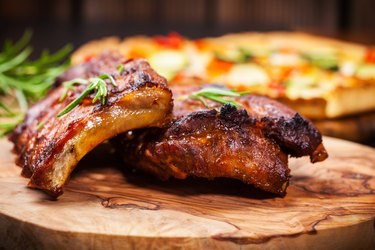
Beef or pork spare ribs are a favorite for many people because they taste great, but they are high in fat. Being well-educated about the nutritional information of spare ribs will help you to adjust your diet so you can enjoy them occasionally. According to USDA's MyPyramid website, a typical 2,000-calorie-a-day diet includes about 265 "discretionary calories" that you can use to "cheat" on your eating plan. Spare ribs can be a source of these discretionary calories.
Beef Spare Ribs
Video of the Day
Cooked beef chuck eye ribs contain 20.55 grams of fat per 100 grams of meat, which is about a quarter-pound of meat without the bones. This serving has 9 grams of saturated fat and 1.3 grams of trans fat. You'll consume 296 calories and 65 mg of sodium per 100 grams of beef spare ribs. Those 100 grams also contain 27.69 grams of protein.
Video of the Day
Pork Spare Ribs
Pork spare ribs pack 21.51 grams of fat into each 100-gram portion, which is higher than the fat content of beef spare ribs. However, these ribs only contain 7.8 grams of saturated fat and 0.188 grams of trans fats, which is lower than the beef ribs. They contain 286 calories, slightly less than beef spare ribs, and 94 mg of sodium, which is a significantly higher amount than the beef ribs. At 23.01 grams per 100-gram portion, pork spare ribs also offer a bit less protein than beef spare ribs.
Considerations
It doesn't matter what type of ribs you eat, how you cook them or what sauces or garnishments you serve with them -- spare ribs are a high-fat food. In many cases, the marinade or barbecue sauce used to flavor your spare ribs will contain a high concentration of fat, sugar and sodium, further compounding the dish's harmful dietary effects. That's not to say that you should never eat spare ribs. Much like candy bars, bacon or any other dietary treat, spare ribs should be enjoyed sparingly.
Tips
There are a few things you can do to improve the nutritional value of your ribs. Buy your own raw spare ribs and cook them yourself. Before cooking them, remove as much of the fat from the edges as you can. Choose a barbecue sauce or marinade that is low fat and low sodium in order to minimize the dish's harmful effects. After satisfying your rib craving, return to a normal routine of eating healthy foods, and stay active to burn excess calories.